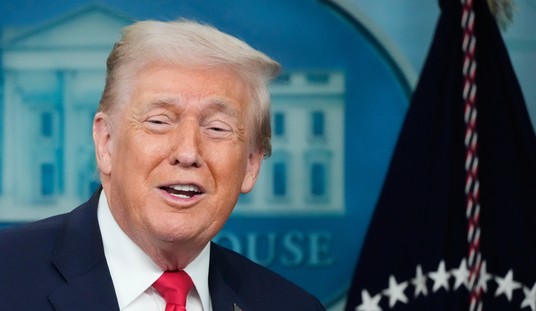"It is bad, bad, bad for the Democrats," CNN polling analyst Harry Enten declared two days ago. Republicans are now in their best position in key swing states "dating back at least twenty years," based on partisan registration data. And to the extent that Democrats are rebranding at all, Enten describes it as "about as good a position as the Cracker Barrel rebrand."
We'll get back to that point momentarily, but let's take a look at the entire analysis, via RCP and Instapundit:
Re: party registration, the Dem brand has about the same appeal with the American voter right now as the Cracker Barrel rebrand does with the American consumer. Bad, Bad, Bad.
— (((Harry Enten))) (@ForecasterEnten) August 26, 2025
GOP is in its best position in the 4 key swing states with party reg (AZ, NV, NC & PA) in 20+ years. pic.twitter.com/ZWmtnkupuV
Look at this: Republican Party gains in party registration compared to this point back in 2017, during the Trump first administration. Arizona, you got a Republican gain of three points. How about Nevada? Up the hill we go, even though we're sticking in the southwest, again, a six-point gain. How about again we come to the East Coast, North Carolina, a gain of eight points for the Republicans. And then the Keystone State in the Commonwealth of Pennsylvania, again we're talking about a gain of eight points.
My goodness gracious, for Republicans, they are converting old former Democrats to their side of the ledger, as well as picking up new voters, registering new voters, and it absolutely paid off for them back in that 2024 election. ...
The bottom line is this: when it comes to party registration, Republicans have made massive gains compared to eight years ago. They are in their best position, in these four key swing states, dating back at least twenty years. You have to go back at least twenty years, at least the case of Nevada, longer for North Carolina and Pennsylvania.
Bear in mind that these numbers only reflect those of states where voters identify their partisan affiliation. A number of states do not require or even provide for partisan affiliation at registration. This bleed-out, about which I have written before, may be taking place across a much broader footprint than even this suggests. And while that may not matter in presidential elections, which are largely decided by swing states, it will matter plenty in House races and state legislative elections over the next few cycles.
Let's get back to Enten's sardonic comment about Cracker Barrel. The company just endured a brief Bud Light moment triggered by a weird decision to change its logo, but which included the exposure of its DEI wokery within the organization. Cracker Barrel hit reverse quickly this week on all of the above, admitted to losing touch with its consumer base, and promised to listen more carefully in the future. The restoration of its classic logo was a gesture of goodwill and earnestness for those promises.
In other words, Cracker Barrel actually listened to its consumer base. That's where Enten's analogy begins to bite, because Democrats still aren't listening to the broad consensus of the American electorate. The Harvard-Harris CAPS poll data have consistently shown which issues motivate voters and where broad consensus exists on policy. Regardless of how voters feel about Trump personally, his actions as president address voter concerns and fit within those broad consensus positions.

If nothing else, voters feel heard by the administration, even if they don't like Trump or his rhetoric. The contrast to Democrats can perhaps be better seen on the issue of crime, which HHC didn't cover until this month's survey. Their data showed that voters agreed that crime had reached emergency status in Washington DC (54%), that Trump was right to order the National Guard to boost policing in the capital (55%), and that 51% expected the deployment to make the city more safe.
What did Democrats do? They attempted to gaslight Americans about public safety in DC and other urban cores in America. They claimed that crime rates were low in DC when they were in fact absurdly high -- even after the corrupt management of crime data by city officials. Nor is HHC the only polling firm to find a broad consensus about concern over urban crime. The Associated Press ran a survey this month in reaction to Trump's actions in DC, and discovered a very broad dissatisfaction with crime in cities, almost exclusively run by progressive Democrats:
Indeed, the vast majority of Americans, 81%, see crime as a “major problem” in large cities — a concern Trump has seized on as he has deployed the National Guard to the District of Columbia and threatened to expand that model to cities across the country. ...
About half of U.S. adults, 53%, say they approve of Trump’s handling of crime, the poll finds. ...
Trump’s approach on crime is similarly popular among white and Hispanic adults, with roughly half in each group saying they approve of the way he’s handling the issue. Black adults, however, are substantially less likely to say they’re on board with Trump’s approach to crime, with just 27% in favor.
Trump also garners much stronger support from independents on crime than on other issues. Roughly half of independents approve of his handling of crime, compared with about 3 in 10 who approve of his handling of the economy, immigration and the Russia-Ukraine war.
We've covered this data in other contexts, but there's an important additional issue in play here. For the past two weeks, Democrats have not only opposed Trump's move in DC, but are actively arguing that the problem doesn't exist at all. Democrat after Democrat has gone on TV shows to deny that crime is an issue at all. They refuse to provide a policy response to crime that differs from the status quo that concerns and alarms the broad consensus in the electorate -- literally an 80/20 position. Rather than address this overwhelming consensus, Democrats instead choose to gaslight voters and scold them for relying on their own experience.
Now, when else have Democrats tried to gaslight voters? Immigration, certainly; they kept claiming that the border could not be secured, and that deportation of criminal illegal aliens was not possible. That is a 75/25 issue in the HHC poll and has been every month this year. Democrats not only refuse to address the issue, they claim the issue either doesn't exist at all or that it's impossible to solve. But even deeper than that, Democrats spent four years lying to voters about Joe Biden's cognitive disabilities, even when those were obvious in his public appearances.
This gets to the core of the Democrat brand collapse. Like Bud Light and Cracker Barrel, they abrogated the public's trust by flat-out refusing to engage consumers/voters honestly. Unlike Bud Light and Cracker Barrel, they refuse to admit to it, let alone take any steps to engage voters honestly, even at this stage. It's that breach of trust and exposure of their lack of integrity that not only has driven their approval ratings to existential-crisis levels but also has prompted voters to either disaffiliate with Democrats or refrain from affiliating when registering now.
Enten's correct to use brand-management fiascoes to explain what's happening with Democrats. That's precisely what's happening at the moment, but at least both of the examples he uses recognized the reason for their failure and took some steps to atone for them with their customers. Until Democrats stop lying about reality, they won't come up with policy responses for issues that matter to voters because they will continue to refuse those issues exist. And as long as that's the case, why would voters trust them to govern at all?







